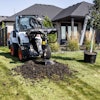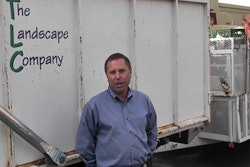In dealing with gas prices, the green movement and an economy that demands you watch operation costs, many commercial cutters are looking for ways to conserve fuel. For one Florida dealer, the answer to meeting his customers' needs, and diversifying his product offering, was found in propane-powered mowers.
James Harrison of Bitter Blue Lawn & Garden in Pembroke Pines, FL, has been working with EnviroGard for roughly four years offering propane-powered mowers. He and his customers are impressed by the cost savings and low-maintenance operation.
The Market for Propane
There aren’t many propane-powered mowers on the market currently, making them a more expensive choice. The ticket price means they are a better fit for commercial cutters and municipalities.
“We market it toward commercial accounts more than residential,” says Harrison. “We’ve sold some to the University of Miami and continue to push them towards commercial accounts and municipalities.”
Harrison saw a lot of success in selling units his first year, but sales have slowed down with the economy. “We haven’t seen much growth,” says Harrison. “In this economy, everyone has stopped buying new equipment; budgets have been cut on many municipal and commercial accounts.”
Pushing Propane
To encourage his customers to purchase a propane-powered mower, Harrison highlights the products durability and the money it can save users.
“It will cut fuel costs up to 40%, due to reduced theft, spillage and evaporation, and increased fuel efficiency,” says Harrison. “They will save additionally on oil because of reduced carbon buildup in the engine.” For one of his cutters, the return on investment was just one year operating the mower.
Harrison’s only regret is the level of difficulty in getting people to consider propane. “There is so much more you can do with propane it’s just so hard to convince people to change,” says Harrison. “They feel unsafe having big propane tanks sitting next to them while they are on the mower. These are department of transportation rated tanks and are truly safer than gasoline.”
Repairs and Maintenance
While most of his propane mower purchasers have been municipalities and commercial cutters who handle in-house repairs, Harrison still provides service when needed. According to Harrison it isn’t often needed.
“Maintenance with these mowers is cut in half,” says Harrison. “Propane is clean, so your engine will last three or four times longer. Many of the people who use gasoline-powered mowers will replace their engines after 3,000 hours because the mower is still good. With propane, your mower will die before your engine does.”
Special technician licensing is necessary to service a propane-powered mower. Becoming licensed is simple with a fee of only $200-300, and a short written test.
Harrison has one certified tech and has to pay an addition fee to sell propane in the state of Florida that costs under $30. He does not sell propane at his dealership but does keep items like hoses, clamps and fittings, which may be replaced frequently, in stock.
For Harrison, propane mowers have become a great what to ensure the satisfaction of his commercial and municipal customer. “Mowers we sold three years ago haven’t come back with any issues,” says Harrison.



















